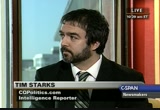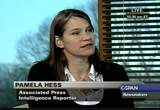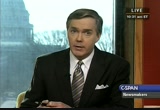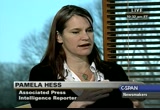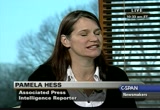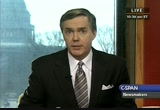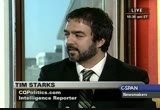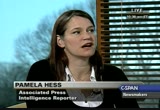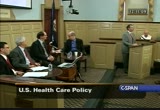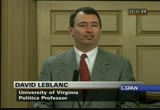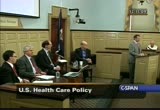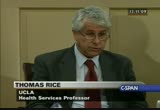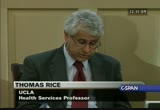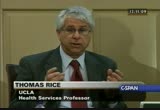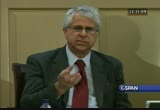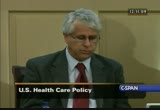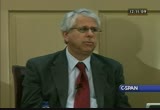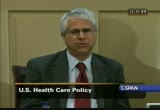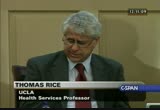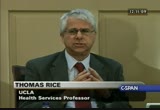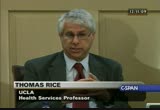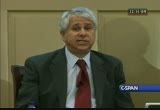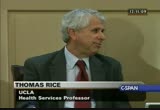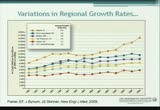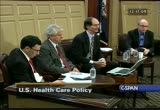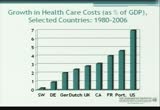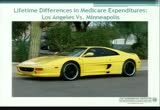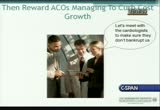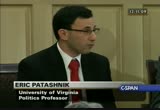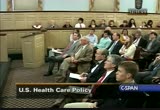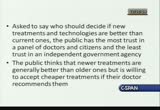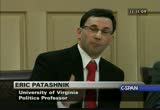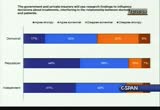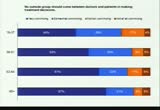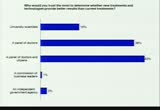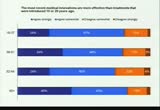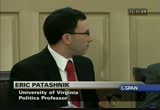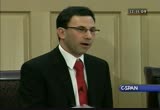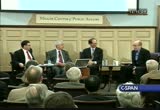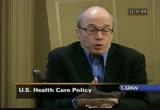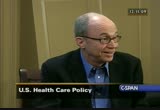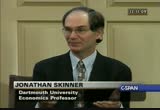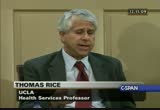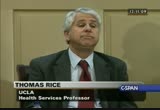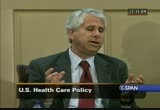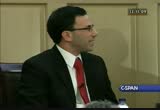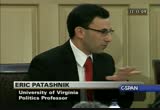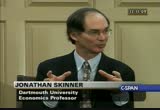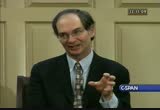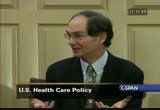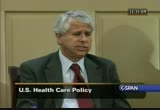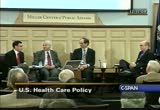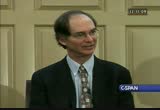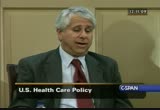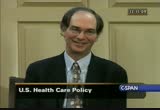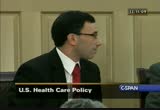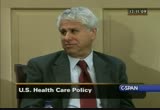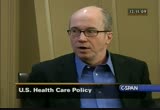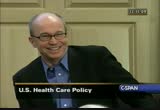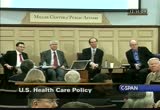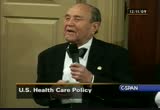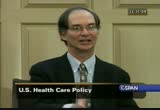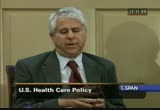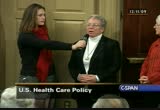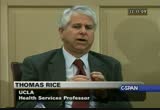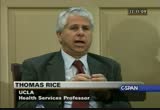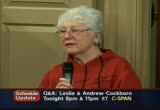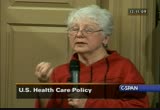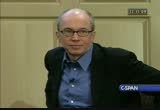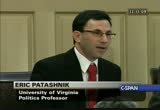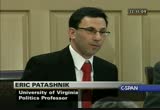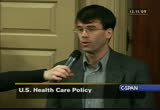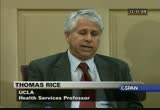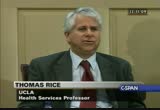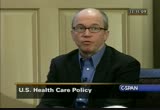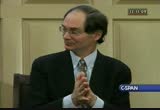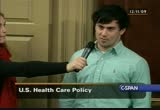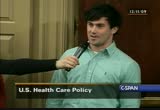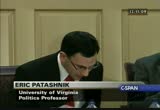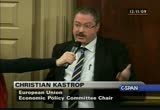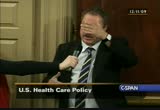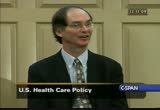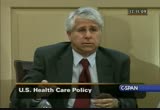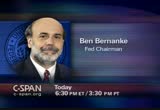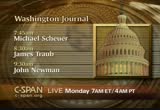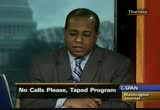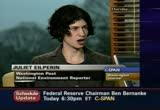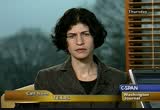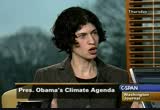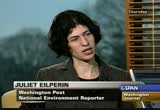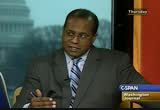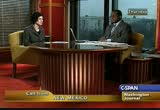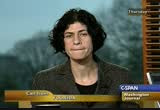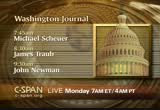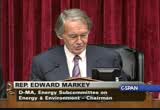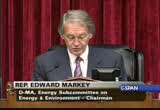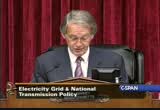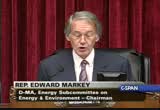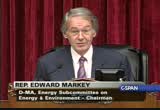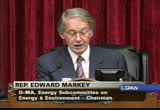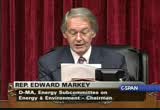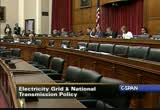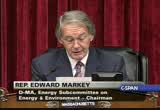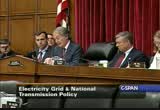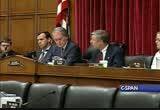tv C-SPAN Weekend CSPAN January 3, 2010 10:30am-1:00pm EST
10:31 am
through a metal scanner and a body imager and a puffer. there will be pushed back from the airlines. it will slow air travel and cut into the money they make. it will slow commerce. host: our guest on "newsmakers", pam hess and tim starks. getting a reaction to the deputy of national security making the rounds on sunday.
10:32 am
the president linking al qaeda to the christmas day attempted bombing attack. more from john brennan this morning on fox. >> there are several hundred members of al qaeda. as we have been able to piece together the story, it is clear he was in yemen for several months. he has reached out to al qaeda. we know he received training at one of the camps that was hit during the month of december. she was clearly directed to carry out this attack at the direction of al qaeda. the senior leadership. this is something we are concerned about. there may be other operatives inside of yemen to send to the west. we need to make sure we maintain this pressure on al qaeda within yemen. host: "newsweek" is calling this latest attack the children of an laden. -- of bin laden.
10:33 am
>> they have been warning us for awhile where al qaeda is an organization is directing operations culminating in the 9/11 attack. the u.s. responded to that. then use of demitasses asian and around the world of cells -0- th - the metastization on it -- or around the world of cells. they were harder to get at the end of the terrorist networks. -- harder to get at than the terrorist networks. it becomes a more difficult problem. i think the next that it is people who undertake a terrorist operations inspired by al qaeda @ within 0 connection to them. they are pulling the knowledge they have of the internet.
10:34 am
the chances of finding that person are increasingly difficult. this is a real problem. i talked to someone yesterday, and we had a little debate about whether what happened was good or bad on this plane. he said, on the plus side, this is what al qaeda has been reduced to. some kid, the bomb is not well made and it does not work. on the downside, you have al qaeda is still grinding u.s. airlines to a halt, phreaking everyone out. making people have less confidence in their government's ability to protect them. i am not sure that the fact that the bomb did not block means that al qaeda failed. it was not as spectacular as success as they hoped for. they are still having the effects of terrorism. this is a really difficult problem for governments to deal with. i think it is only getting harder.
10:35 am
>> janet napolitano has done a tremendous job over the past year. i worked closely with their. i know there were criticisms about her comments that the system work. the system worked after the incident. the president wants to make sure we are able to take the corrective steps necessary, but he needs to hold everyone accountable including me. host: what does that mean for janet napolitano and others? >> there have been a couple of lawmakers who say that she needs to go. it is far too early for that to get much momentum. kit bond, on the republican side today, said no, she does not need to go. it seems way too early for heads will roll.
10:36 am
if there is another incident, people will point to this and say, she has done this and this. and then there will be pressure. i do not think there is much pressure within this administration, a least from john brennan, to get rid of anybody. he did say, we are looking at everyone. at all levels, we are looking for accountability. it is not out of the question that someone might be asked to leave, but it does not seem like it is anywhere near that point now. during the last administration, if you look how long it took for someone to have that kind of pressure amount and for the administration to get rid of them, thousands of people died. nowhere near the host-- that. host: if you were to write a headline that from today's appearance, what would it be? >> it is hard.
10:37 am
one of the places that we would be hit was the camp where he was trained. that is the duke -- first acknowledgement from a u.s. official that there is understanding or knowledge of what went on. we believe the u.s. lead that attack but have not been able to get details of them. i think he vowed to destroy al qaeda. i think i am proving why are read the stories and not a headline story i am sorry. host: pam hess with the associated press and tim starks, as we did -- did into some of the details. thanks for joining us on "newsmakers". >> michelle malkin it is our guest on "in depth." she takes your calls, e-mails twandand tweets.
10:38 am
live at noon eastern on c-span"k tv". >> my possessions are now in a storage bin. >> in this week' "american casino," their war-winning documentary on the effect of some pride mortgages. >> the debate over health care. this event was hosted by the university of virginia. this last about an hour and 25 minutes. [captioning performed by national captioning institute] [captions copyright national cable satellite corp. 2010] >> good morning, everybody. welcome back to the conference on the world economy at the
10:39 am
university of virginia's miller center. this year's conference is devoted to government through its debt and deficits. yesterday we learned about the use and abuse of this school rolls across countries and states, exchange rates, a global dimensions of u.s. debt. today we turn our attention inward and export policies and associated attempts to handle health care expenditures and the possibility of designing legislation to deal with the debt and deficits. we will continue our discussion and i want to remind the participants of a few ground rules. first, our presentations are intentionally designed to be short, to facilitate discussion among panelists and with the audience. when our moderator decides it is time to open the floor, those of you with questions, please go to the back of the room where there will be a microphone and she will allow you an opportunity to ask your questions. the second reminder is that if you have cell phones,
10:40 am
blackberries, i phones, anything electronic other than a pacemaker, please turn it off. the signals from those interfere with our tv and our microphones. i will pause for a moment while that happens. i feel like we are getting ready -- we are in a flight and are ready to take off. our first session this morning is entitled "dealing with debt -- prescription for reform". our panelists th include thomas rice, a professor and the department of health services at the ucla school of public health. jonathan skinner is the third center professor of economics at -- economics at dartmouth. our third ea catalyst is a
10:41 am
professor of public policy and is the associate dean of the university of virginia public affairs. and the deputy managing editor and executive editor of "the wall street journal". >> thank you, david. each of these gentlemen will make a presentation of no longer than nine minutes. if they do go longer, i urge you to start fidgeting or russell your newspapers. by the way, at least two are reading "the wall street journal". idc "the new york times" back there. -- i did see "the new york times" back there. we will have a discussion among us and then we will on the floor to all of you. tom is going first. >> thank you very much. i am delighted to be here. i'm glad we're talking about health care costs now, because that is 8 important part of the
10:42 am
dead. i will focus on what factors are -- that is important part of the debt. i have only two slides. the first slide shows you how much of an out liar the united states is with regard to health care costs. you might think we spend a lot because we are rich. that is not the case at all. on the vertical asked -- access, we have how much we spend per person. and then on the vertical ac xes we have a much the country spends -- how rich the country is. the u.s. spends about twice as much per person as other countries do on health care. we are 56% higher than the
10:43 am
swiss. why are costs high are here? this is what i will be focusing on. there are economic, political, historical ones. i have come up with a list of four reasons why i think health care costs are higher in the united states than elsewhere. a lack of consolidation of purchasing power, medical technology and specialization, paying for unnecessary care and fee-for-service medicine. i am only going to talk about the first one of these. i will leave the others at the end because john skinner will talk about the other three in his talk. to understand lack of consolidation, take a counter example which would be canada. canada has a single payer system. there is only one buyer of care in canada, that is the provinces. it is a monopoly on the buying side. they have tremendous power in
10:44 am
the negotiations of hospitals and doctors and pharmaceutical companies. they did not always have this. in the 1960's, they were like the united states. they relied on private insurance. they spent more than we did on hospital and physician care. since they consolidated and had the government get involved, they have -- the costs have been much lower than the u.s. costs. i do not think the insurance companies are going anywhere in the u.s. we need to look at the model that involves an shores. there are many models out there. that involves insureres. one example would be france. the government does the negotiating and coordinating of the prices they paid to hospitals, doctors and farmers of local companies. germany has a consortium of
10:45 am
insurers. that do their own bargaining and they pay, and rates to providers. to meet, the key is not to have one buyer as in canada, but if you have multiple buyers you want two things to be true -- you want payments to the coordinator between the insurance companies, and you want the insurance companies to be nonprofit. that is something we do not have in the united states and are likely to have. -- unlikely to have. other countries do allow people to buy supplemental coverage to give greater benefits. that is probably necessary for political stability, but it takes away from the equity of some of these systems. there are other advantages of this coordinated buying. the providers to not have an incentive to choose one patient over another. right now medicaid patients are
10:46 am
not worth much, so doctors did not want to treat them. there is also no opportunity to cost shift. everybody is paying the right amount. one pair is not taking advantage of another paper. yer,. . we have one example in the united states in t and that is the v.a. system. they pay about half as much as private insurance plans pay under part d for prescription drugs. we are relying on private insurers and competition and part d, it is not as effective as the v.a. let me talk for a moment on private insurance. we rely on that here. it is for-profit insurance. i think it leads to higher health care costs. by definition, they have to make a profit.
10:47 am
in addition to that, they engage in marketing. they also engage in medical underwriting. they want to make sure they are not taking on people who are too expensive. the are costly things, so that raises the price. in addition, they do not have as much bargaining power. so you might ask, why do we allow private insurers to have a monopoly? >> the answer is that we do not -- there is no reason to think that the savings would be transferred to the public. what you really need, i believe, if you are going to have insurance play middleman, would be nonprofits. we do not have that in the u.s. let me just end with a few thoughts about reform. the current proposal before congress is -- really do very little to control costs.
10:48 am
that is a reasonable short term strategy. i know people will disagree with that. if you look at my slide, the proposals do nothing to consolidate purchasing power. the public option is a caveat. they do little to deal with the proliferation of medical technology and to get doctors to be in primary care. in terms of paying for unnecessary care, and fee-for- service care, there are some nice things in the bills that talk about movement towards accountable care organizations, moving away from fee-for- service by bundling payments, not paying for unnecessary care. but these are going to probably start with pilot studies and it will be a rocky road to get from the research evidence of the wholesale changes in the u.s. health care system. in the short term, i do not think we will be doing much to control costs. as i said, i do not think that this is --
10:49 am
one more thing. one thing we are interested in doing is have more research in comparative effectiveness, what things work and what things do not. eric is going to be talking about that. when congress gave $1 billion for research, it said that we could not look at the cost. we could only look at the benefits. this is something that my colleagues in australia will look at benefits call it nonsensical. how do we choose the most cost- effective? but it is a political decision that congress made and it will stymie us as we go for it. why do i think that putting cost aside now might be a good idea? i think it is to build a political constituency, you cannot talk too much about cost control. it is not a mom and apple pie thing. every dollar of cost you save is a dollar of income you take away
10:50 am
from someone. if you're putting together a political constituency, that is not the way to do it. what we should do is what medicare did in 1965. it was a christmas tree in the beginning. that is how they got the legislation passed. after that, then they started putting restrictions. in fact, we must be doing a good job, because now everyone is -- scared that medicare pays so little because it is too stingy in its payment. we did put cost controls and later. medicare does have its financial problems. let me end by saying, i think the public option would have had the potential to control costs, because you could sell insurance, it would garner market share. that could allow for the consolidated purchasing power i talked about to reduce costs which would bring more buyers there. reading the newspapers, it does
10:51 am
not look like we will have a public option. that would be the one way in which i could see a health care reform having potential for controlling costs. on a positive note, it is not about costs or dead. if we move towards universal coverage, we are going to be creating a system that will be more malleable to the changes we want to see with regard to cost containment. if we can get everybody under the same umbrella, we would have one system, it would make it more possible to control costs. >> before i move on, let me ask you one question. when you talk about consolidating purchasing power, you are talking about a system of price controls or something close to price controls. the question is, we know that the lower costs, but what with the effect be on innovation, on quality of care, etc? >> so we have a nice natural
10:52 am
experiment, because almost all the countries do exactly what you are saying. let's take germany. it is a system that spends far less than we do. the medical outcomes appear to be better than ours, and they do not have to wait for services. waiting time for services in germany is in more than the united states other countries that i talked about, france, have excellent outcomes. i do not think you will necessarily be sacrificing quality. commonwealth fund has done a survey of six countries. in surveying physicians in the countries. they have ranked it inch of the countries. the u.s. comes in last altogether. and comes in last in terms of quality. canada came in fifth. it is the other european countries that tend to do better.
10:53 am
there are examples of price controls. , where it appears they can pull it off with a system that provides high quality care at a lower cost. >> john? >> thank you. i am going to switch over. well, i am delighted to be back to charlottesville. the university of virginia gave me my first job. i have a truly wonderful time here. it is a nice to see students here also. -- such as eric. who wandered into my class and realize that the drop date was too late. it made for a wonderful time. i'm going to talk a little bit about the quantity side. tom has talked about getting prices right, which is something economists like to talk about. i am going to look at the
10:54 am
quantity. how much health care are we getting? is it the right amount? it may involve the different solutions and to getting the quantity right. prices matter, but they may not -- there may be other ways to get there. first of all, i want to make this observation. if you talk to most economists and ask why our health care costs growing so rapidly? why are health care costs imperiling the fiscal soundness of the united states government going 4 for the next 20 or 30 years? they will give you one answer. technology growth. it gives us good things, but it also cost more money. my usual response is to go back to an earlier debate about gun control where people used to say guns do not kill people, people kill people. it is not technology growth itself that causes cost to grow.
10:55 am
it is the people who use that technology. it is the rate of diffusion across the population that affects the growth of health care spending. what i will show you is that there are different regions in the united states and different countries in the world that have dealt differently with that kind of growth rate i will show you some pictures. here is one from an earlier article. there are regions in the united states -- from the dartmouth atlas. it shows the change over time in spending between 1992 and 2006. these are adjusted for inflation. adjusted for age, sex and race and the medicare population. i am sorry that type is a little small bird that orange curve on the top is miami. it started high and it grew at a faster rate. the place i wanted to notice is san francisco, which is kind of a yellow color.
10:56 am
their growth rate was only about 2.4% per capita during this time. compare that to the 3.5% growth rate in the national average, and the idea is that if we can figure out what it is that san diego does that -- at san francisco does, even at dallas does that the rest of the country has not figured out with regard to restrain growth, we can basically get medicare back on an even keel for the next few decades. if you run the numbers out. if you say, san francisco -- 2.4%, united states, 3.5%. that is a difference of 1.1%. the difference grows over time. this is something economists teach. compound interest. it is the differences you can see between current projections, the blue line, the versus and
10:57 am
what would happen if we manages -- managed to slow growth by 1.1%. it is dramatic. that is the key to getting health care costs under control. it is not something that has never done it -- never been done anywhere and the united states. we have to learn from how they do it and to provide the right incentives to do it. right now medicare has no incentives to reduce growth rates. in fact, they will pay for anything that does not kill you. the second observation is that, it gets back to some of he think that herb stein, president nixon's economic adviser used to say, what he said is that unsustainable growth is unsustainable. health care costs cannot or without limit. current projections and that -- is that they will account for more than 100% of gdp if they grow at the current rates,
10:58 am
within 75 years cured that is not something that is going to happen. we can look to other countries to see what has happened. this gets back to my earlier point about how different countries have dealt with technology growth in different ways. the number on the left-hand side is the change in spending on health care as a percent of gdp. the u.s. is at the right. that means in 1980, u.s. health care spending was a 9% of gdp. in 2007, it is 16% of gdp. the difference is 7%. the left-hand side, there is sweden. and denmark. both of them have not grown health care by more than 1% of gdp. they have sustained it. that is a sustainable growth map for those places.
10:59 am
why sweden, why denmark? why it germany, as opposed to the u.s.? there is some hint of this. change over time in gdp, on spending on health care, and to confine the u.s. in the upper left-hand corner which is 7%, and you notice sweden and denmark on the lower right-hand corner, below 1%, sweden and denmark started -- the key is that sweden and denmark started with a very low tax rate in the 1980's. you cannot raise taxes much about 40%. you can see that in berkeley. there are natural limits as to how much you can spend on health care. -- you can see it empirically. defeat health care, you have to raise taxes. there is no other way. -- to feed health care, you have
11:00 am
to riasaise taxes. there are limits which the u.s. is not comfortable with. the third point, and this is getting back to tom, is that there is lots of inefficiency and health care. i promised a map. this is the dark must referral -- hospital referral regions. they're spending $60,000 per person -- $16,000 per person. there is a lot of money going on. if you count up a lifetime differences between los angeles and minneapolis or miami in minneapolis, you end up with a really nice car. . .
11:01 am
11:02 am
we need to do more of this. there is a lot of savings potential that you would not pick up with comparative effectiveness unless you start monitoring quantities and what doctors did in different regions. tom mentioned accountable care organizations. doctors decide. it is not some panel in washington or some insurance company. the idea is that the doctor/hospital groups are paid based on how well they restrain growth and costs. this is the scenario we would like to have played out rather than rules from above. the physicians in these groups get together. the internal medicine doctors go to the cardiologists and ask what is going on because the rates are highest in the country. they can look at the records and
11:03 am
try to get costs down. it works internally. that is the direction of like to see for health care reform. >> one question that tom answered in his comments. do you see anything in the current bills in the house and senate that will do much to deal with the problems you have outlined? >> i agree with tom. they're trying to set up 3 marks for these kind of a terrible care organizations. -- they are trying to setup frameworks for these kinds of comparative care organizations. the greatest disaster would be to do things too quickly, have them not work, and have people reject the whole idea. >> in other words, it is a good first step. >> i see this in the short term, get the price is right. in the long term, restructure
11:04 am
the way that health care is practiced so that people are in more integrated groups. >> the rapid increase in per- capita help spending in the united states would be much less worrisome if we thought that every dollar it was contributing to better outcomes for patients. there is reason to believe that a large portion of spending is wasteful and inefficient. this persists because we do not have the mechanisms for identifying it. the u.s. health care system often adopts the newest and most sophisticated treatments and technologies, even if there is no objective scientific evidence that suggests they are better than available alternatives. congress and the obama administration have been supporting increased spending on comparative effectiveness research to generate a reliable information about what treatments work best for what patients. the hope is that better information will reduce costs and improve quality. other nations use that information to some degree.
11:05 am
the recent controversy over a mammogram guidelines revealed that efforts to alter treatment or protocols can develop into a political firestorm. that can lead to tremendous backlash among providers and patient advocacy groups. what does the general public believe about medical evidence? this is a new issue in the public debate. we do not know much about how ordinary citizens think about it. will they abide evidence-based restrictions on care or coverage? what are their biggest concerns about this initiative. to get these questions come up my research partner, alan gerber and i, recently conducted a public opinion survey. i want to share preliminary results today. they are hot off the presses. they are subject to revision. we think our results are sharp and unambiguous in of the week of confident insuring them.
11:06 am
here are some key findings. the public expresses some support for the concept of evidence-based restrictions on medical spending. it is clear they do not fully understand the problem. the large majority are convinced their research on the effectiveness of different treatments will not be useful and that guidelines are vulnerable to corruption and abuse. almost everybody is worried about this. the two groups that are most fearful are republicans and senior citizens. they are particularly skeptical of treatment guidelines. they fear that they could lead to rationing and interference with the doctor-patient relationship. if we ask people who should be deciding if new treatments and technologies are better than current ones, the public has the most trust in a panel of doctors and citizens. they've least trust in an independent government agency. the public thinks that new treatments are generally better than old ones. there seems to be some support
11:07 am
in public opinion about being willing to accept cheaper treatments if their own doctors recommend them. let me show you some graphs to highlight this. if we ask people if they think that it is ok for medicare to pay for new treatments only if they provide better results than current treatments? -- a large portion of americans will say it is ok. if you ask them -- hard evidence is often unavailable about which treatments work best for which patients. only 14% of the public thinks this is completely or almost completely accurate. there is a lack of full understanding of the problem. 41% of the public thinks it is almost completely inaccurate. if we begin to give the public some of the reasons pro and con
11:08 am
about comparative effectiveness research, we want to test which ones resonate the most with the general public. some arguments people are making against the research have a lot of traction among the public. one is that the research will not be useful because medical studies focus on the effects of treatments for the average patient and each patient is different. people feel they are individual. somehow, these studies will not be useful for them. there is a much various. -- there is so much variants and each one has their own issues. these treatment guidelines are not going to keep up with the pace of medical innovation and reflect the scientific breakthroughs. somehow, they think will be obsolete as soon as they are formulated. 73% of the public believes that. here is one where we are
11:09 am
beginning to see some of the peers the public has. this one is that the public and government insurers will use the findings to influence decisions about treatments, interfering with the relationship between doctors and patients. the public cares deeply about having the relationship with the doctor. the majority of voters have this concern. republicans agree strongly at a high percentage, as well as independents. there is the idea that some outside entity will come between doctors and patients in making treatment decisions. democrats find this somewhat convincing. republican and independents are in stronger numbers. we see the same concerns about outside interference among all age groups, but especially
11:10 am
seniors. they are particularly worried about is happening. 67% find this a very convincing reason to be concerned. 21% of seniors find it somewhat convincing. government and insurance companies will use the findings to ration care as in the united kingdom. we see concerns throughout the political spectrum. republicans and independents are more concerned than democrats, but there is concern everywhere. we gave people a list of possible entities that could be making these decisions about whether new treatments and technologies provide better results. who should be making these findings? we give people a range of possibilities. the group that people trust the most our panel of doctors and citizens. university scientists might rank fairly high among people in this room but do not fare as well.
11:11 am
business leaders did poorly. only 3% would have trust in an independent government agency. >we followed up about who he would trust the least to determine if treatments and technologies are better. the independent government agency wins by a nose over commissioners and business leaders. it was neck and neck there. here's the breakdown by demographic groups of up to help people rank those who have the least trust in government agencies. that is 39% of the overall response. 50% of seniors. this is new. this is something political scientists have not spent a lot of time surveying about.
11:12 am
we're trying to understand how americans think about the health care system. it is clear that people think health care is getting better and that new treatments are more effective than those introduced 20 years ago. a large majority believe that. that is especially true among seniors. i thought this was interesting. if your doctor tells you that there are two equally effective treatment that your insurance will pay for completely so there will not be any financial impact for the patient, would you still prefer the more expensive one? 30 their treatments. one is more expensive. one is cheaper. -- there are two treatments. would you want the more expensive one is someone else's pain? the majority does agree with that. they were willing to defer. that was more among whites than other groups. we do not know why.
11:13 am
this is about doctors mediating costs and prices. individual patient looked to doctors for guidance. >> i was to watch what they do and not what they say. >> absolutely. -- >> i would still watch what they do and what they say. >> absolutely. 55% of the public and 59% of seniors believed that modern medicine can cure almost any illness for people of access to the most advanced technology and treatment. we believe in america that medicine can keep a strong -- keep us young, healthy, and alive. 54% of the public believe that improvements are the most important reason that people live longer today than 75 years ago. we gave people a lot of reasons about better nutrition and other
11:14 am
things. they say it is medical care and that is why we're living longer than our grandparents. i do not know if they're right about that. [laughter] the last point here is that if you ask a lot of experts about why health care is so expensive, you come back to be service system and the distortions it creates. specialty groups care deeply about their patients. they do act in ways to maintain their income. is there a recognition that this is part of the problem? only one in three americans believe that maintaining high incomes for professionals is important when doctors are making recommendations for patient care. >> we should feel free fortunate to get an early look at these fascinating numbers. >> i should stress that they are preliminary. >> we're happy to have this.
11:15 am
it is fascinating. the three of you have made a compelling demonstration that the current system in the united states is indefensible and unsustainable. to quote the president, "the status quo is not an option to c." we are in the middle of a great debate about how to move forward on health care. there could be something approximating a single payer system where the purchaser uses comparative effectiveness to decide what payments -- treatments to pay for and what treatments not to pay for. the other direction is whether we can do in health care area what we've successfully done in many other areas of the economy
11:16 am
and create a functioning market place where consumers have bundled care. they can look at studies and see what works better or what is more cost-effective. they can decide on whether to spend savings on it. there could be some sort of system were choice works to keep costs down and quality of. it can satisfy the public belief that the government is making choices for them, they will get stiffed. i would like to ask the three of you to comment on that debate. is it real? as you pointed out, tom, nobody else is taking the market model. on the other hand, americans have great faith in the market. they've seen it work to their benefit in airlines, telecommunications, and other industries. why not in health? [unintelligible]
11:17 am
[laughter] >> touche'. >> that is a great question. it gets to the fundamental question about whether the united states is different from other countries, whether it should look to other countries for a model of how to reform health care, or whether it should continue to try to make something that it feels comfortable with that has obvious links in the past. a brilliant surgeon wrote an article saying that if you look at health care reform in other countries, they often draw on their existing structure to move it forward. i think people find it difficult to make market-based decisions at the time of deciding what treatment to get. i ran into this recently when i
11:18 am
got a call from the vet about my cat and whether i wanted to spend $600 on an operation that had a 1/3 chance of success. this cat is not even like me. [laughter] i had to make that call. imagine making those decisions about family members or myself. i do not know how to do it. i like best a system where everyone gets a voucher worth a certain amount of money for their own insurance plan. they can choose whatever insurance plan they want. it is single payer but it is not a single provider. if i want to get an insurance plan that tells me in advance that we are not going to pay $30,000 for that treatment for pancreatic cancer that extends your life like two weeks and as a consequence your premium will be less, but you have to agree to that beforehand, i would sign
11:19 am
up for that kind of plan. >> does any other country in the world use that kind of system? [laughter] >> they use other methods. it is new and different. it is not exactly the way other countries do it. it is an american market-based solution. if you want to go first class, that is fine. you pay for it. >> i am guessing that you would not agree with that based on your comments earlier. >> in our country, we ration based on what john was saying. other countries to the rationing on the supply side. they do not have as many specialists available. they do not use technologies as much. basically, the russian on
11:20 am
medical the necessity -- they ration on medical necessity rather than ability to pay. i think that is a better way to go. >> eric's numbers show that the american public is profoundly disturbed by anything that approaches government agencies making decisions on care. >> i was in favor of the independent government commission. [laughter] >> you were part of a 3%. >> it was quite eye opening. distrust in government is not new in the united states, but it is getting even greater. i wanted to get specifically to your question about choice. i thought about consolidating market power as a way of controlling costs. i do not think that works well here. i can give an example where people who disagree with me
11:21 am
would cite this example. that is medicare drug benefits. they give people a tremendous amount of choice. most people have about 50 different choices of medicare plans. if you have tried to do it yourself or for a parent, you will see how very difficult it is. i have tried to do that with a parent, for example. it does not work out well. it is very hard to figure out among 50 plans which is the best for you. the program is being touted as cheaper than expected. it is being over-touted. when people make a choice one year, they do not change to another plant in subsequent years. year after year, people stick with the same plan. research has shown that people could save a lot of money if they switch. most people are in the wrong plan for themselves. those that switch on average could save hundreds of dollars a year. when you give people a lot of choice, they do not have enough information, the time, or
11:22 am
expertise. they end up making bad choices over time. >> it sounds to me like you were not talking about -- in other words, the choices have to be fairly simple and managed. if there are 50 or 100 different choices, you have a problem on your hands. >> i think tom's point is well taken. people can get a jury confused. health insurance is a very complex product. -- people can get very confused. health insurance is a very complex product. >> what do the numbers tell you about how to solve what is a grand and ideological debate about how to move forward on health care question mark? >>. two different ways to do it, on the system or individual level. the problem in the united states
11:23 am
is that we have not been willing to make either choice. in this country, we have recently delegated to physicians and providers. they are the experts and know what is best. they should tell us what health care we need. the problem we're finding is that physicians are not very good at controlling costs. they often do not have the information to determine what is best. >> part of the reason we have been unwilling to make the choices that we are greatly divided on a very big question. do you think your poll results will help us get to an answer? >> i think the poll results show there is tremendous distrust in government. if we're going to have any intervention, will have to be a new, institutional structure that is not seen as a federal agency. in the senate bill, they're talking about a nonprofit organization. i have concerns about how well that would work, but it is responsive.
11:24 am
the membership will provide representation for a lot of different groups but not so much on the research side. there are differences between the house and senate bills in that way. it suggests going back to john skinner's point at the beginning. it is changing the culture of physician behavior so that they will see results in their hospital or practice and began talking to one another about why they're doing things that way when colleagues in another state are not. >> those groups -- studies could inform different groups. they could inform doctors or consumers. where do you think they're likely to have the most effect? >> i think it will ultimately have to beat physicians. -- i think will ultimately have to be physicians.
11:25 am
there has to be a sense of physicians working together to decide what is best for their patients. the studies are quite definitive. a recent one showed that a spinal procedure has no good effects on average. "the boston globe" interviewed a decision and said he worship at the altar of comparative effectiveness but he did a lot of them and the patients seemed to do well with them so he would keep doing them. there seems to be a total disconnect. how will that surgeon changes behavior -- changed his or her behavior? together, they realize that this group of patients are providing limited funds. >> the payment is not dependent on how many searchers.
11:26 am
>> exactly. at that point, physicians will start putting pressure on them and ask if they are sure they're getting better results and see if they can do it better. >> the straightforward way to go would be to give the medicare agencies the power to say that we will not pay for this if it does not meet our evidence-based tests. congress has been unwilling to give that power. the language trying to promote comparative effectiveness research goes on to say that we will do it but it cannot be used. >> it is because that smells of the government agency rationing care. >> medicare could try to do it but it would be a disaster. >> you need this and i want to do this, but the government will not pay for it. >> it could maybe be a 30% copiague. the more effective -- it could
11:27 am
may be a 30% co-pay. the doctor could -- the patients to tell a doctor they could not afford them. they would have to change the practice or the patients would go elsewhere. >> when you are dealing with life and death, making an economic decision is difficult. i think we have all been in a situation where the size of a co-pay on a drug we have been prescribed may determine whether we get the generic or the brand name. >> i agree with jon that the incentives are probably more effective at the physician level rather than the patient. when you are sick, you are not able to make the rational calculus. we have not been giving physicians very big economic incentives to act in the way we're talking about. there's something called pay for performance. you give physicians more to do things that fit into medical guidelines.
11:28 am
incentives tend to be small. we could be rewarding something besides quality. with not used the research evidence enough to try to tailor economic incentives to make it worthwhile for physicians to follow the practice guidelines. >> the other thing that has been unfortunate in the debate is that it has been framed almost entirely in terms of controlling costs. that is important but there is another side. that is improving quality. i do not want to go to the doctor and have a problem and the doctor not know what the best treatment is for me. i do not want that for my children or wife. i want to of the best possible medicine. the reality is that my doctor may not know because the study has not been done. tried to frame this as a quality improvement -- trying to frame this is a quality improvement or allowing each american to have the best science, that would be a more positive frame.
11:29 am
it has not been pushed in that direction. >> if you have studies done by the government and clearly publicized, how big a difference would that make? >> not as much as you might think. you are asking an economist. ucla will take away my degree if i do not say that incentives really matter. [laughter] >>. , he did not answer the question that the others answered. -- eric, you did not answer the question that the others answered. what do you think about the house and senate bills? >> they do not go very falr in terms of cost control. they do have interesting ideas of the pilot level. history suggests that most of those will not be institutionalized. the thing that gives me some
11:30 am
hope is that this is unsustainable. there is going to be pressure for us to make hard choices. unfortunately, that is the mechanism that is going to pressure us to face up to these costs. >> i find this similar to what happens in education. that is another area where the market system does not really work. you have all sorts of great pilot projects that people can point to going on all of the country, but they do not get adopted. there is no best practices process. there is no incentive for others to do with the best people are doing. why is that? >> for institutions to adopt best practices, they take a big hit. they lose money from medicare if they keep their patients out of the hospital. >> it does not pay to use best
11:31 am
practices. >> there's a article from the "new york times" magazine from a doctor in new york city the scrimmaging with these things and trying to get best practices by measuring outcomes. he acknowledged that we take a hit financially, but it is the right thing to do to provide the best quality health care. there are not many people who can manage to do that. >> tom, your analysis of why you thought the health care bill was the right thing to do, i thought it was very interesting. it mirrors what i hear some of the proponents and opponents say about the bill. you think it will take us down a step towards where you think we need to go. that is some sort of single payer buyer system.
11:32 am
and by interpreting that correctly? >> not quite. i do not think this bill will bring us their. the public option does not seem to be a big part of it. unlike the bill because it will give us near universal coverage. -- i liked the bill because it will give us near universal coverage and get rid of insurers charging sick people more. i think that is what we need to get legislative. then we can worry about cost containment. i am skeptical about being able to use the leverage of purchasers the way other countries do. i would still like to get this passed. >> jon, you made a compelling argument that as costs go up, taxes will go up. as taxes go up, we will get health care costs under control. you did not really tell us how that is going to happen.
11:33 am
it is a historical fact and other countries. what is the mechanism for that? >> we do not know questi. we have a specialist here. >> one thing that is fascinating is the tremendous acceptability of taxing in the united states before the economic downturn since the 1950's. we've really only taxed at the federal level at about 18% of gdp. with added medicare -- we have added medicare, medicaid, and increases in social security. we tried to keep taxes level. we have not said that we want a bigger government and more taxes. >> are we not inevitably headed towards 30%? >> i have not seen the political willingness to raise taxes to that level in either party.
11:34 am
>> let's put taxes aside and talk about spending. spending has stayed around 20% of gdp. do you see any way we will not find ourselves 20 years from now that something closer to 30% of gdp? >> if we are spending that much, it is going to be cutting out of the things we could be spending on. at some point, americans might not find acceptable. we were quite successful in the late 1990's through strict managed care. there was a backlash. through accountable care organizations, that might provide a mechanism and allow us to manage care better. one way we have control premiums recently is charging higher deductibles. that is on the demand side. there are lots of way to get health care costs under control. there has to be a will to do it. if it is crowding in on other
11:35 am
things we want more -- >> prediction, 20 years from now, government spending as a percentage of gdp. federal spending in 20 years. >> 24.6%. [laughter] >> i think it will be between 20% and 30%. i do not think we will go all the way to 30%. >> public partial -- pressure will force it down. >> i think we should open it up to questions in just a minute. if you have a question, make your way to the back. i want to ask one more thing based on the numbers. the difference between republicans and democrats is pretty straightforward. republicans tend to have less faith in government and more face and individuals. how do you explain a senior
11:36 am
citizen number? many of these people are already in the government run system and probably have the most familiarity with the health care system in society. >> i think most seniors do not think they are in a government program. [laughter] they see their own doctors. they have a lot of choice. they are in medicare advantage. they are in a private program. they do not see themselves as recipients directly. [laughter] when the medicare program was set up, it was designed deliberately in many ways to preserve the physician autonomy. people view it that way. >> do either one of you want to add to it? question, go ahead.
11:37 am
>> i am mortimer caplin. no mention has been made of the employer-employee relationship and the employee having an exclusion of income for the cost of plans paid for by the employer. at one time, these costs were paid by the employer. during world war ii, there was price control. there was a shortage of labor. great pressure was put on the internal revenue service to come out with the ruling which excluded this from income, which was rather strange. the employer paid for your food or clothing, that is taxable. but health care was taken out as a way of attracting more labor back to the market.
11:38 am
what you think the impact on cost would be if congress reversed the situation? >> before they answer the question, as irs commissioner, did you try to limit the employer tax benefit? >> no, it was later incorporated in the statute. it is articulated carefully in the statute right now. >> i remember a story you told me 20 years ago when congress took away some of the deductions for travel and entertainment. you were in a very posh, washington restaurant. the waiter dumped your real in your lap. -- the waiter to dump your meal in your lap. [laughter] >> he said he had never done that before. what do you think about that?
11:39 am
senator mccain when he was running for president was calling for that. there's a lot of discussion about the cadillac plans and the difference between the chevrolet and the cadillac. >> i agree with you on the cadillac plan. that would provide a fixed dollar amount or tax credit for plans. to really get the revenue and say to firms that you are on the own and this is not tax deductible at all, i think he would end up being criticized. you are trying to keep this balancing act where firms provide employee health insurance. if you no longer give them the benefit, many more will just say, "find." -- many more will just say, "fine." he would have a public defacto
11:40 am
planned -- you would have a public defacto plan. i think that is the balancing act they are falling. i agree with you. i am a big proponent of the cadillac tax. >> i am curious about when your irs commissioner if you tried to get rid of the tax deduction for home interest, mortgage interest. >> the internal revenue service and congress, all of this is in the code. one of the things i had to commit to when i came up for confirmation was that i would really follow the law. [laughter] >> one reason i have mixed feelings about your proposal is that our current system of making the employer contributions to employee health
11:41 am
benefits tax deductible is that it is regressive. it favors wealthier people. they are more likely to have health insurance. they're more likely to have comprehensive policies. they also have higher marginal tax rates. it is an unfair system that we have right now. deductibility of home interest is a regressive system as well. we do not give that to renters. i think there would be mild savings. i think there would be tremendous political opposition to taking away across the board. it was suggested 30 years ago. someone was saying that you take the money and give everyone a tax credit of the same amount to make it more fair. that seemed like a reasonable way to go to me. >> karen johnson. years ago, when hmos were first
11:42 am
introduced in the system, they were thought to be able to solve some of the incentive problems. they would bring into the organization issues associated with over use of technology that was not effective, over use of specialists. the physicians would see the trade offs because they were sharing in the pot of money. is there any evidence that hmos did this? is there any proof that the incentive question can be managed? does it seem like hmos are lauded as having changed things fundamentally? >> i will start off. in the beginning, it appeared the was something great going on with hmos. you went to a building that was an hmo. the marketplace did not favor this. of the growth happened -- all
11:43 am
the growth happened in independent practice associations. this is where you are going to a doctor but they are paid in a different way than the fee-for- service patients. that model did not work very well in containing costs. there is no corporate culture to control costs. people seem to favor that. relatively few people stayed with the kaiser. i think the hmo models that people are going to now are not the type that have the corporate culture that led to cost control. if you look at rates of increase in health care costs, hmos have not done better than fee-for-service medicine. their enrollment has declined as people have gone to ppos that give them more flexibility. the model that works is not very
11:44 am
popular among americans. kaiser is popular in california. that does not exist many pages -- places right now. >> kaiser grows about same rate as other places, but it is consistently lower. that would not be a bad thing. that is the model where physicians are on salary. during the 1990's, they tried to expand. they were contract in with private physicians and negotiating on price. if a physician did more things, they would get paid more money. they did not scale up. there was not this fundamental set of incentives. they never worked particularly well. it is a bit of a mystery why kaiser-like programs have not swept across the country. i think in part it is because they are not paid that much more
11:45 am
relative to fee-for-service. fee-for-service physicians can typically make more money. there is this idea that once you are in there, if you do not get the same amount of choice. you would stick with your own doctor. they would be organized in a default structure where they are paid on the basis of the number of patients in their practice. they would still see the same doctors and go to the same hospitals. >> good morning. my name is ann newmark. i have been grateful recipient of medicare for six years. i have not had to call upon it very much. it is a form of socialized medicine. that is not a dirty word. nor is helping our veterans.
11:46 am
that is socialized medicine. medicaid is also a socialized medicine. the point i would like to make is in complete agreement with the first speaker. i was very ignorant about the rest of the world, industrialized countries at least, and what they offer their citizens. yes, i do have a question. i have recently learned much. i am very grateful. i wish that everyone in congress had read the book i am currently reading. >> what is the book? >> "proclaimed ignorance." >> this is the book where he has shoulder pain? >> is a book that should be read by every american.
11:47 am
i saw two very evident differences in our country and other countries. taiwan has a wonderful medical system. i am not a physician. when doctors come out of medical school, they have a tremendous amount of debt unless they come from an extremely wealthy family. plus, their malpractice costs are so astronomically different. in some countries, i do not even know if they have not practice. we pay far more for our pharmaceuticals than any of the country in the world. i do not know why but perhaps you can address that. my question is, do you feel that lobbyists are influencing
11:48 am
congress? it may be from the ama. are the pharmaceutical companies more influential than intelligent information that our congressmen are not receiving like this book? >> who wants to take that on? >> of course, lobbyists are of tremendous influence. it is inevitable. in many ways, it is beneficial in a representative democracy that groups who feel strong on an issue will organize to petition the government. i think it is remarkable degree to which these things and gotten on the agenda. president obama understands this issue and is concerned about it. it has gotten there partly
11:49 am
because of researchers pointed out these amazing patterns. we are spending a lot more in some parts of america than in other parts. the people do not seem to be healthier. something weird is going on there. even have lobbying pressure. you could have organized groups. -- you can have lobbying pressure. when a problem exists and enough people are pointing to it, the elite this course will change. a couple of years ago, i have the privilege of giving a talk at the miller center about some of this research. i talked about the need for more evidence and some of the problems. it was a challenging talk. this was maybe four or five years ago. many people in the room had not heard about the issue that medical evidence was a problem. there were a lot of physicians in the room that were resisting the idea there was a problem. i think that has changed. among the well-educated public, there has been a recognition
11:50 am
that this is a problem. we have a hard time going from agenda setting to actually solving the problem. lobbyists have the most influence where laws are written. that is very hard to overcome. >> i am a faculty member at the miller center. i want to follow up on one aspect of the current compromise in the senate on the public option. you mentioned the nonprofit planned. the other aspect of that is the medicare b anuy in for some age. although the cost is an unsustainable, it has been lower than the overall health care system. i am curious about the panel's view on the medicare buy-in as
11:51 am
part of the cost control. there's the question of the public option. i have a follow-up on the point made. given the long term and sustainability on health care costs, i am curious about why employers have been so resistant to change. there has been mixed support for reform in general. i am curious if that relates to issues of ideology or aspects of technical dimensions of reform preferences. >> i think we all probably have opinions about the medicare buy- in. it surprised me when it was in the newspaper few days ago. i like the idea of more people
11:52 am
being able to buy in to medicare. it it's my belief that power on the buyers' side is a way to control costs. the opposition is that the rural states are against this. they are saying that their hospitals are not paid enough by medicare. it is a slippery slope. there is a concern that it could morphine to a single payer. it is natural there would be concerned. -- there is a concern that it could morph into a single payer. it is natural there would be concern. i do not think this is going anywhere. they planted the idea. there seems to be too much opposition. i do not think it will be in the final compromise. we will see. with regard to the employers, that is a great question.
11:53 am
they originally favored the clinton bill in 1993. they changed their mind about it. you mention ideology. the best answer i have is that entrepreneurs do not like the idea of tremendous government involvement in anything. i will defer to the others. i do think that ideology is a big part of it. on the surface, you think there would like to get out from under the mess. >> we do a meeting once a year with 100 ceos from large companies in different industries. we had a group of them in washington a month ago. two things were clear. there was enormous interest in measures to reduce health care costs. many of them served on various panels. a number of them had been in to meet with the president and secretary of health and human services. to a person, they felt like the
11:54 am
legislation itself had gone in a direction where it was not going to do anything to reduce their health care costs. they were pretty much unanimous. i gather that the but three of you would not disagree with that. -- i gather that the three of you would not disagree with that. >> aside from putting every doctor on salary in the united states ban overnight switching to an english system, it has to be an evolutionary process. there seems to be recognition that incentives matter. the current fee-for-service system does not seem to be working well. that seems to be promising. it is the first up. i agree with tom. i think covering the uninsured is the first step. health care reform is going to be on the agenda for at least the next decade. i do not see it happening once
11:55 am
and stopping. >> president obama said the other presidents have tried to reform health care but he would be the last one to do it. that is a promise that is not going to be kept. we're going to be modifying our health care system for many years. dupoand >> if there is a bill, t looks like it will be on a strict party-line vote. one thing you should never do is let go of the microphone. he has it and is holding on to it. it will have to be quick. >> i take your point on preferences with the current bill for employers. do they think that they can deal with cost control in the current system if we do not take this first step? >> no, i think there's huge frustration. >> i am a third year undergraduate. my dad is one of the cardiac of elegists -- cardiologists bank
11:56 am
robbing -- cardiologists and bankrupting america right now. [laughter] he is currently being audited. he and my mom who handles the insurance part of the business has to go back and look up five years of records to check every procedure. he and other doctors for spending time we did he and other doctors are spending time recording dictations -- key and other doctors are spending time recording dictations. my father is discouragingly from entering the medical field. he says i should do plastic surgery because there are no insurance companies and it is cash. age have for going into the medical field?
11:57 am
if the best and brightest decide not to go into medicine, what is the future of our medical system as a whole? >> with regard to malpractice, there was an earlier question as well. the key evidence suggests it contributes about $60 billion per year in spending. that is a lot of money. but relative to the $2.2 trillion in health care spending, it is relatively small. we desperately need malpractice reform. it may save money, but we are exacting a terrible toll on physicians every day when they go into work. they do not know of today is the day they will get sued for something that they may not have caused. things that are bad to happen in health care. that is the way the human body is. they will get sued as a consequence.
11:58 am
the jury will take pity on the poor individual and award lots of money to them. the implication is that the physician did something wrong when they may not have done something wrong. one of the interesting political puzzles is why not practice -- not practice reform is not on the table as a way to get the republican side of congress on board along with physicians and the ama. >> it is partisan politics. it is bad partisan politics. the bill would be more likely to have support in the long run. i also find it puzzling. >> trial lawyers are loyal supporters of the democrats. >> we did ask one question about malpractice. it is clear the public is particularly worried about the combination of our current malpractice system and having
11:59 am
more studies. 70% of the public we interviewed agree -- 78% of the publicly interviewed agreed on the studies. they think doctors will have to follow them even if they think another treatment is better. >> we will have to limit it to one more question. >> i am from the german ministry of finance. the german system was praised by some of you. some of you feel the german system is a complete mess. [laughter] is it two europe system -- it is a two tier system. it is policy driven. it is paid out our payroll
12:00 pm
contra divisions -- payroll contributions and state subsidies. in germany, we have a feeling that we pay for pharmaceuticals much more than in italy. in the public system, there are big disincentives. what works is good incentives. we are rethinking it. we have done a lot of reforms. they did not work out. people are getting more annoyed with this stuff. what about a system that is mixed between the public and private system? . .
12:01 pm
maybe we can draw also on some of this experience from the public systems. >> is the danger there that the health of people opt out of the public system behalf? >> the danger is that it would become like medicare. in other words, if you were seen to propose that we move on medicaid up then that we move medicare down. the political will to maintain medicare is because of people over age 65, many of whom vote,
12:02 pm
are in favor of medicare. whereas medicaid is for a group where there are probably fewer voters. that is one consequence why medicaid payments have lagged far behind even medicare. >> germans are always so critical of the system. they have a terrific system. the last 20 years they have been engaged in constant reform. i think that they have made their system better. the mix that you have now with about 10% with private interests are the most wealthy people. that is a nice match. in the u.s. we have maybe 20% on medicaid, although it pays for 40% of the births -- there's not enough public support to sustain that at a good quality. that mixture would work for me.
12:03 pm
>> i was surprised by this question that a lot of americans believe that the doctors can do everything. have you ever checked this fact against the sample of doctors? >> and that is next. >> thank you. [applause] >> think you, panelists. we will take a 15 minute break and then reconvene to talk about making policy. >> federal reserve catcher ben bernanke says a stronger regulation should be the first line of defense against speculative bubbles. he also says he is not ruling out higher interest rates to
12:04 pm
stop dangerous and bubbles from forming. his comments come from remarks prepared for an annual meeting in atlanta. we will have the entire speech today beginning at 6:30 p.m. eastern. >> i really think it is gone. you do not own it anymore. you are trespassing. and at hertz. my positions are now in a storage bin. what was able to get out before the house was locked up. >> this week, lesley and andrew on american casino -- there are award-winning documentary on the impact of subprime mortgages are minorities. >> tomorrow, a former cia ben lot and chief discuss is the alleged terrorist attack. and what the obama administration should do james
12:05 pm
from "the new york times" concerning joe biden. and the author john newman discussing jfk's family of vietnam and comparing it to obama's handling of afghanistan. >> now a discussion on the climate change agenda of the obama administration from thursday's "washington journal." host: juliet upper and joins us from "in washington post, the national environment reporter. welcome to the program. caller: good to be -- guest: good to be here. host: how far as president obama gotten into that agenda? guest: one thing he made clear from the beginning is he wanted to impose a nationwide limit on greenhouse gas emissions linked to climate change.
12:06 pm
this is something president bush opposed during his eight years in office, and he was also committed to forging an international treaty which would produce global limits on greenhouse gas emissions. in terms of doing that, he has made some steps through regulation, but he has failed to achieve the overall goal, whether it is on the domestic front or international front, and one of the key things will be looking ahead to 2010, whether he can get congress to enact legislation to put a nationwide carbon cap host: looking from the international perspective, was he as successful as he wanted to be going to copenhagen? guest: no, he was not as successful as he wanted to be, but he does given the fact that the u.s. had not adopted any kind of climate legislation. he was able to at least achieved one u.s. objective, which was set up a way the international community can see whether major emerging economies like china,
12:07 pm
india, brazil, permitting voluntary greenhouse gas emissions cuts they say they are going to be. but he did not achieve the overall goal that many americans and europeans were looking for, which was a binding international agreement to cut greenhouse gas emissions. host: and the reason why he could not that the binding agreement -- was it because he could not get enough international cooperation, or is it just that they did not want to hear what he was trying to say? guest: it was a combination of things. part of it was because the u.s. had not acted on his own -- on its own, he could not commit the u.s. as the number two greenhouse gas emissions -- the matter in the world, to cut emissions. in addition, he would face the problem that under the current way our climate treaty, the global climate treaty is structured, many major the
12:08 pm
bidders, including china and india, are not required to make greenhouse gas reductions. many countries in the industrialized world were saying they refuse to commit to future binding cuts if there was no way of bringing in the major contributors to global warming like china and india into an international regime. host: are these folks still upset about not been full participants in the kyoto treaty? guest: there was some of that, although that was not part of the central discussion. that was part of the debate. we understand that you have been out of the game for a while, you are back in it, with but we need this season, defended the legislation, and that is ñrsomething the senate failed to deliver in time. host: so what is going to be his strategy heading into 2010 to get the senate on board? can he get the senate on board given what he has had to wrestle with in order to get health care
12:09 pm
legislation passed? caller: dep -- guest: that is an open question. that will be one of the top questions in 2010. he has just asked senators to take a serious leak. on health care, he has alienated key republican senators. unlike health care, climate legislation simply will not make it to the senate without half a dozen republican votes. so he is going to be working this issue hard in the spring of next year when this bill is probably going to be moving he is going to have to make some policy concessions, and again he is going to a to placate some of these republican senators who say, look, you did not include us on health care, why should we believe we will be full partners on climate change? host: we're talking about president obama's climate agenda with juliet eilperin of "the washington post."
12:10 pm
give us a call. 202-737-0001 for republicans. 202-737-0002 for democrats. 202-628-0205 four independents. you can also send us an e-mail or twitter. who are some of the republicans he has to get on board and democrats he has to smooth things over with to get them to support his plan the agenda on capitol hill? guest: when you look at republicans, it is an unusual mixture. it is not a defining geographical area that they come from. it is everyone from the stokowski, from alaska, the top republican on the senate energy committee, to lindsey graham, most involved in crafting a kind of bill from south carolina. but then you have the two main moderate republicans, as well as a handful of others. bob corker from tennessee.
12:11 pm
it is a mix. with a lot of the moderate democrats from the country, you're talking but indiana, michigan, ohio, even arkansas. it is a range of people that has çto work on it. it's still our main -- our first call comes from -- host: our first call comes from california. caller: happy new year from california. i am a democrat and i am very upset with president obama. i think he should get the academy award, not the nobel peace prize, because he has just let us all about. i do not think he really cares that he has let us down. with the environment, he led me down there. with health care, he led me down there. host: joanne, how did he let you down with the environment?
12:12 pm
caller: he really did not say anything. he looks into the camera with this straight face, and he is lying to the american people. democrats especially are very upset with him, and what gets me is he does not care. he has thrown us under the bus, and he knows it. host: but specifically, what has he lied about? caller: well, when he gets in front of the camera, all the promises that he made -- he is going to help the poor, he is going to take care of the environment, the people to work -- put people to work. host: thanks, we are going to leave it there. let's move on the clinton township, dorothy, on our line for republicans. go ahead. caller: hello. can you hear me now? host: yes. caller: great, because i heard a sound. i call back in november on
12:13 pm
basically the same subject. as far as obama's agenda on climate change, i'm so happy the agreement was not signed. as far as what he intends to do, it is part of the big, broad picture for social justice to take our wealth and transfer it to other countries' wealth. since he has taken office, everybody's wealth has disappeared to begin with, and if he does anything else, he will take away our sovereignty. it will be worse. we are going to be a third world country and and power and in which other countries. i think his agenda is a bunch of bunk. a surprise he mentioned senator inhofe, because he has been one of the opponents of climate change. it is a big farce, a joke. all of the emails, it has not
12:14 pm
been over 10 years. back in may, as far as september, lies were being told. it is a big farce. host: thanks, dorothy. guest: your caller is referring to a few things. one issue is giving money to foreign nations because that is really an important part of the debate over what kind of global agreement you get. basically a lot of developing countries are saying the industrialized world, the rich nations, emitted these greenhouse gases, and they need to pony up billions of dollars in order to help the developing world cope with the impact of climate change. that's absolutely is to be part of any global deal. it is the tentative accord that was reached in copenhagen. there was a commitment to provide $30 billion over the next three years that industrialized nations would provide. europe would give a small part of that, the european union and japan would provide the bulk of
12:15 pm
that. and that is something where the u.s. is counting on passing a kind of climate bill that would allow private carbon market to generate a lot of it. it is a huge financial commitment and something to stir up a lot of domestic debate here in the coming year. host: the next call comes from louisiana on the line for independents. caller: happy new year to the all of you. i would like to make a statement. the one is about the subject at hand and then i would like to make a statement about the most defining moment. in this a little speech that
12:16 pm
obama gave i counted no less than six lies there. this climate change professional you are supposed to have on here, this global warming think -- if it is true then you can please explain to us why it in the middle ages the temperature of the earth was a lot hotter than it is now. what caused a that, campfire's? host: can you tell me one thing specifically that the president lied about? caller: he said there was no doubt in the suns. apparently he did not get the letter with 31,000 scientists who signed it and sent to him saying that global climate is a hoax. guest: the caller is referring to the medieval warming. where in europe but there are temperature records that indicate a warmer period. this has been something that
12:17 pm
people who are skeptical point to as evidence that there is not climate change going on now as a result of industrial activity. it was located in one area. their questions of whether it was applieabroad a global trend. there were not the same recording instruments of then as today. there are some scientists who continue to question whether there is a connection between greenhouse gases and climate change, but the vast consensus believes the linkage exists. question some aspects of it do not question the essential finding. many do not question whether human activity has contributed to global warming. host: jersey city, new jersey, all of our line for democrats. go ahead. caller: hello.
12:18 pm
happy new year to everybody. i was calling about the environmental concerns. every year, california has fires that cause a lot of devastation, and we have to keep paying money to put out the fires. every year there are water shortages in a lot of parts of the country, and there are floods and other parts of the country. we are not going to be able to use irrigation and water pipes naturally to create jobs and water availability. guest: one thing you're caller points out, again, the fact that we're seeing more intense forest fires and drought in the west -- again, there are -- there is quite a lot of evidence that this is climate change, and it is something the federal govern is acting on. when you talk about a nationwide
12:19 pm
system of irrigation, that is something that would be hugely expensive and raises the question when you have less water in the first place to distribute out into these areas, the idea of doing broad irrigation seems unlikely, i would say, from a policy perspective. the farming community demands most of the water for its own purposes. host: does the obama administration have a formal plan to try and reduce the number of forest fires? do they believe there is any connection between a large forest fires and global warming overall? guest: yes, they have identified the connection between forest fires and climate change. the u.s. geological survey has done research on this. there are a lot of these issues that generally come under the nameç of the adaptation to climate change, so secretary salazar has launched an initiative on this. the agriculture department is it
12:20 pm
different methods and ways of adapting to forest fires and managing forests to minimize the impact. host: we are talking about the president's, the agenda with juliet i'll parent of "the washington post." next, tom, from texas. on the republican line. caller: first of all, the climate change that the lady here is talking about is posted and directed by the builder bird -- the bilderberg group. everybody knows that al gore stands to gain a very huge amount of money if this were ever to be passed. the other thing is, mr. cannon, who was on their earlier, he said something about part d.
12:21 pm
when that was added by president bush, that did not have a penalty to pay a fine or go to prison with. and to this day, you can still not have part d if you so choose not to. host: thanks, we're going to leave it there. this concerns about the president -- former vice president gore? guest: i have never heard of that group. in terms of al gore, the former vice presidentç has investments in clean energy initiatives. this has come up in the media and his response has been that he is putting his money where his mouth is, and the idea that he is investing his private dollars in these initiatives should not be seen as a conflict of interest. he is a interesting figure because he has made the american public more aware of the issue of global warming through his movie "an inconvenient truth."
12:22 pm
host: does he have any influence on the obama administration and then laying out their time and agenda? guest: i think that he is one of their advisers, without question. host: explain, if you can, what cap and trade is, how it would work,ç at howard fits into the president's agenda. guest: this is the market-based approach to curbing greenhouse gas emissions. it would set an overall limit for greenhouse gas emissions and ratchet that down year after year. basically the industries that emit greenhouse gas emissions would have a couple of choices. they could either install technology so they release less carbon dioxide and other greenhouse gases, or they could buy credits from other people
12:23 pm
and treat them, and that is where the cap and trade, said. this has been used, for example, when there was legislation on acid rain several years ago. the use a similar approach. it is often more economically efficient than the command and control pollution that we have had in the past. again, it has raised controversy simply with the idea that includes a cap, for example, with the idea that we would have higher emissions in some areas of low emissions and others. host: is this something the obama administration would like to see happen? caller: absolutely, the cap and trade is essential to any solution addressing greenhouse gas emissions. it's come back to the phones. on our independent line, -- host:, back to the funds. caller: it does not seem like
12:24 pm
you are very tough on them. cap and trade, it is still toxic. that is the problem with that system. why doesn't anyone have the nerve to enforce anything and make polluters pay? regarding president obama, if you have got the president's saying go ahead, ship those in from alaska, i used to be a democrat, and i am an independent now. i tell you what, i have watched so many false moves, i am starting to think he is a straw man. the book of a good face for the people, but he is acting for the rich guys and the corporations. we cannot have a public option in a democracy? host: who did you vote for in the last election? see, i voted for obama, but i will not again. -- caller: i voted for obama, but i
12:25 pm
will not again. guest: u.s. in dissatisfaction with obama for the fact that he has not moved more aggressively and legislatively on curbing greenhouse gases. although, in fact, the administration has done a lot of things domestically through the environmental protection agency. what of the things to watch is if the administration fails to convince congress to pass legislation next year. what you will see most likely is the environmental protection agency will regulate greenhouse gas emissions, and that may end up being the solution that they come up with on the issue of climate change. host: the house has already passed the bill? guest: exactly the house has already passed the bill, and that in many ways is similar to what has been moving through the senate. but one of the issues is it is clearly -- that blueprint is not
12:26 pm
conservative enough to get votes. moderate democrats and liberal republicans, moderate republicans, to get them on board. they are trying to retool it and will have to come up with something different for the house, although it has many similarities, and there will be an effort to compromise and coordinate it to have a law that president obama consign. host: is this like health care all over again? guest: there are different dynamics, although there are going to be certainly legislative concessions to buy off votes. one thing that is interesting is that health careç is somethinga lot of americans can identify with personally. one of the things the administration and the congressional leaders have struggled with is the fact that in many ways climate change still is not as attractive to a lot of people. its coat tobias in birmingham, alabama, host: tobias in birmingham,
12:27 pm
alabama, go ahead. caller: hello? the use this time for major legislation, make more effort to address the economy. because it is not going to be an extreme priority to the place where -- i did not say that this climate change moving forward, but in reality -- i do not say that this climate change moving forward, but in reality, leaving obama -- blaming obama, talking
12:28 pm
about obama. you can find everything he will say or do is attacked, so you need to be very careful host: tobias, thanks for your call. guest: i think one of the things to buy as is pointing out there is the tension in the debate. in the long run, you are going to have an economic benefit from curbing read us gases, and it will spur innovation in green technology here at home, but it will be essential if we're going to shift to a low-carbon economy. in the short term, there will be some economic dislocation, and you'll be hearing a lot about that, including higher energy prices, as part of the congressional debate early next year. host: we have this week. "the best way to deal with climate change is to reduce the çrole taxes by 30% and add a 3% gas tax." guest: that proposal has
12:29 pm
certainly been raised as a possibility, but it seems that that is not generally the direction in which congress is headed. but the idea of kind of reducing taxes somewhere and raising them in order to do exactly what the writer is talking about, making energy more expensive so people will use less of it, is certainly one way you can address the dust gas emissions. host: paul matos, georgia, on our line for republicans. go ahead. caller: with all the pressure come down through the media to get us to accept that climate change is real, i do not know anybody that believes that it is. i do not believe that it is. and this cap and trade thing, here it is. we are putting more and more restrictions on american businesses, causing more and more of our jobs to go offshore to countries where they do not have restrictions, and the
12:30 pm
missions are even greater because they do not have water quality problems because they can just go straight into the rivers and the streams. putting more pressure on businesses here in the united states, more jobs going offshore. i do not see where this game is great for the american people, all i see is jobs lost. host: before i let you go, why don't you believe that climate change is real? caller: because i have read history. we have@@@@@ ÷a:zz:åjzz@8@8@,t> they say that the polar cap should have been melted vinyl. it is. it is still there and going. i do not know what they're talking about here.
12:31 pm
host: thanks for your call. this goes toward part of that thing you talked about earlier, that this climate change is not necessarily an idea that the general public can grasp? guest: we are not necessarily seen it with the calls you're getting, but polling shows that three-quarters of americans or so believe that climate change is real and caused partly by human activity. that has dipped a little since the high point a few years ago. it has particularly fallen off among republicans. y done where there was a 22% drop among republicans who believed in climate change being real. overall, it is still a high number, but you are right that people and not necessarily seeing it in their own lives when there is a winter that as colder than the one before, or a summer that is not as high. people are seeing short-term
12:32 pm
climate changes, and they will not conflict that with the broader issue over a period of time. host: next caller, go ahead. caller: the solution is that we have to stop turning the 10 commandments into the top 10 inconvenient truths. he did say that it is an environmental rest state for the -- you can say that it is an environmental rest state for the earth. host: all right. çóin "the wall street journal" e hunt for clear polish there's future. many biologists look for -- the hunt for clear polar bears future. in presenting that kind of
12:33 pm
information, where it says there are fewer places for the bears to go, but apparently there are more bears out there, how do you get that message across to people in a way, or how does the administration get the message across to people in the way that supports their intention that we need some sort of climate change legislation? guest: i think that is one of the challenges in communicating silescience. whether you are a journalist or an administration official, i think again the polar bear is a classic example. when you are talking about long- term trends and the idea that live there is the head on sea ice, summer sea ice to do for hunting and fishing that they need to feed their cubs at themselves, you can very clearly look at what is happening and see how arctic sea ice is disappearing and shrinking, and that is consistent. but of course when you said that right now the population ahas nt
12:34 pm
dipped dramatically, that is hard for the american people to accept. host: juliet upper uncovered the impeachment of bill clinton, -- juliet halperieilperin was repog for roll-call, and also has written for louisiana and florida newspapers that the state news service. back to the phones, clarion, pennsylvania. steve on our line for democrats. go ahead. caller: i had a quick question. i wanted to ask -- there are a lot of countries that spoke during the copenhagen summit, and they seemed to have a different agenda as far as paying attention to climate change and the issues at hand. iq was wondering, what is the
12:35 pm
best way america can bring them in closer toward the issues that are important, the issues that are being discussed at the time, and try to get them to change and work with us on some sort of compromise instead of being so rigidly against our whole idea as far as climate change legislation is concerned? guest: that is going to be a real challenge. the caller is talking about one of the most contentious moments at the end, with a handful of countries including venezuela, sudan, cuba, bolivia, who objected to the very weak accord that countries were agreed to in terms of addressing climate change internationally. there are a number of reasons for that, including the fact that a number of those countries are oil producers, so they would stand to lose from a global cap on greenhouse gas emissions.
12:36 pm
several of these nations who are opposed to what the united states does -- hugo chavez from venezuela basically compared bush -- compared obama to bush in his speech and implied that obama was as much as the devil as bush was. so i do the know to what extent the administration will be able to bring those countries into the fold. it underscores the challenge you have when you are working internationally trying to get a consensus agreement with 193 countries. that is a hard thing to do. host: what does on the agenda for 2010? is there another level meeting? guest: -- is there another global meeting? guest: there is another meeting. that is really going to be one of the top issues, and in some sense it is going to be determined by what the united states does here and whether we have a binding, the bill.
12:37 pm
that will be a key factor and there will be others as well. host: said this kind of -- so this kind of ups the ante? guest: president obama that with these other world leaders from china, india, europe, and other countries, and he personally invested in it being a successful outcome. whether he can ensure a successful outcome remains to be seen. host: wilmington, north carolina, brendan, on our line for independents. caller: i think everybody is missing one big point on the whole environmental issue. regardless of whether it is manmade or what is going on, something is going on. glaciers are melting, water levels are rising, and we are
12:38 pm
running out of fresh water. that needs to be an immediate concern in the environmental debate. guest: i think the issue of water shortages is something that needs to come up in the debate. the department of interior is looking at this. it is a real issue, particularly for americans living out west. it is something that, for example, california governor arnold schwarzenegger has made one of his top priorities. there is no question that this is a real and urgent issue, in this and many other countries. for example, in india, where a lot of their water comes from the himalayas and various have got no rain. host: with health care, which saw the target date for getting something to the president's best has moved us to the president's desk has moved --
12:39 pm
has moved to the president's desk -- is there a similar time line? has he said to the senate that i need to have this on my desk by a particular date and time? guest: harry reid has said he hopes to have legislation on his desk in the spring, with the idea of finalizing it by the summer. it puts a lawmakers in a bus precarious position. this is a timeline that has already -- in a less precarious position. host: next up is new mexico, marty on our line for republicans six o. caller: yes, my name is marty. i would like to say on this global warming, i do not know if you guys are familiar with the
12:40 pm
slingshot effect, but scientists do not ever talk about it much. the slingshot effect is, once every 10 years, as we rotate around the sun, we get closer to the sun, and then after that 10 years of slingshot around the sun, i think we get a lot further from the sun. so you are going to have 10 years of warming and 10 years of freezing, the north and south poles freezing up. 10 years, if you check your compass, you will notice that that 10 years that we are closest to the sun, it will be
12:41 pm
exactly a half a degree off. host: marty, let's bring this back into the perimeter of climate change. are you saying that there -- back into the parameter of climate change. are you saying that there is an effect with this slingshot on the climate change we are caller: exactly, because you are going to get 10 years of warming, 10 years of freezing. guest: i have not heard anything about the slingshot effect. the trends we are seeing have lasted more than 10 years, so i am not sure in what period we would be seen this. host: next caller, on our line for democrats. caller: good morning. i was calling because i want to
12:42 pm
thank of war because he is letting people see, and people -- the public to think al gore because he is letting people see, and people can see for themselves that the ice caps are shrinking. also, i want to say, do the republicans reid? -- do the republicans reid? do they read? my dog. i have a question for the young lady on your show. she says one thing about something good, and then she will flip-flop and say something else and confuse people di. either is or is it ain't. come on, that is what confuses people. host: what are you confused about? how do you believe that juliet eilperin has flip-flopped?
12:43 pm
caller: she says republicans are for climate change -- not for climate change, right? then she turns around and says but the white house -- hold on, she says that the democrats -- i am nervous -- first she says the democrats are for it, then she turns around and says a lot of democrats are not for it. host: we are running out of time. sorry to cut you off. guest: in that instance, i am describing the political land slated there are a number of rank and file democrats, including some key moderate democrats, in the senate, who are not. host: our last call comes from mesa, arizona. jim, on our line for republicans. caller: there are a few things that juliet has said that i would like to correct.
12:44 pm
in arizona, we have been a dry state,ç but the tree huggers he not let us clean up our forests. they will not let us clean up our debris. then we are talking about al gore and how great he is on this. why won't he debate anybody unless obama and nancy pelosi, john kerry, they all fly their private jets around like they are going to the corner store. c'mon, i called john kerry's office one day and i said you gave his big speech on climate change. is theresa finds ready to give up their private jet? they said this call is done. they want the middle income people to do this, but al gore does not fly in anything but that private jet, that 20,000 square foot home that he finally been agreed after he was caught. why don't you talk about that?
12:45 pm
and the forest fires in california, there are people california, there are people setting them. host: we will leave it there. the one thing that i wanted you to address, is there anything regarding brushed clean up in either the house or senate bill? guest: no. there is always a debate over exactly this kind of issue concerning how much pressure clear out. one of the problems is that logging companies don't have the financial incentive. it requires taxpayer money. certainly, forest management is one of the things that addresses of forest fires although there are broader trends. host: thank you for being on the program. >> tomorrow, a former cia osama
12:46 pm
bin laden chief michael concerning a certain flight. james with "the new york times" magazine and his recent article on the joe bottom. and the john newman, an author on vietnam compares it to obama's policy toward afghanistan. >> now available, these bands but, abraham lincoln -- the great read for any history buff. a contemporary read on abraham lincoln from 36 scholars, journalists, and authors. in hard cover of your favorite bookseller and nell in digital audio to listen to any time,
12:47 pm
available where digital audio is sold. >> last year the energy department said aside $60 million in stimulus funds for studies on how to upgrade the nation's electrical system. this house hearing from june it looks at smart red technology -- smart grid technology. ed markey from massachusetts shares -- chairs the committee. this is about four hours. >> welcome to this very important hearing on the future of the grid and the proposals for reforming the national
12:48 pm
transmission policy. there is no more central issue to resolve here then this question. three weeks ago the energy and commerce committee passed the american clean energy and security act of 2001. this landmark legislation on which the house will send the will revolutionize our nation's energy policy creating millions of clean and jobs, saving consumers billions of dollars, and unleashing trillions in new investment. the 21st energy grid it will play a central role. it will multiplied energy productivity through smart grid technologies. the waxman-markey bill
12:49 pm
recognizes this by establishing a new framework to plan the grid of the future. we task the federal energy regulatory commission with establishing national grid- planning principles. it will use it to support and coordinate regional processes across the country. within three years the commission must report back to congress on the results of this effort to get the with recommendations for further congressional action if necessary. some believe we should go further by expanding federal authority to plan and set new transmission lines. that includes overriding state decisions to reject proposed lines, and using federal eminent domain authority is necessary. i think we need to look closely and skeptically of whether such a step as warranted at this juncture.
12:50 pm
i urge caution for three reasons. first, if it ain't broke don't fix it. as several of the cells, there are number planning process is under way from the new england area to the midwest, to the west. which give them time to succeed. one of the biggest obstacles is not a lack of federal authority but rather uncertainty as to what energy policy that grid must serve. by establishing national renewable of two city standard, a firm cap on commissions and curbs to electrical demand this bill will provide the 70 needed to guide private, state, and regional development of the
12:51 pm
transmission system of tomorrow. second, look before you leap. transmission is amongst the most complex and controversial aspects of energy policy. today's hearing is literally the first hearing in this committee, in this committee, or the last congress on transmission. we cannot afford to take a ready, fire, an approach in this area. further, there appears to be little common ground amongst course decoders'. to give just one example we invited to the edison electric institute which represents investor-owned utilities that own most of the nation's transmission system to testify today. e.e.i. cordially declined, in part because it was unable to agree on the witness that could represent the disparate views of
12:52 pm
its membership. the testimony before arrest confirms it is very tough to find agreement on in this area. third, to a man with a hammer everything looks like a nail. a precipitous action could result in a policy that is ill- suited to address the problems at hand and could lead to perverse consequences. for example, the western governors association will testify today that "western governors see little benefit in preempting state transmission line permitting processes because "the major hurdle for permitting transmission in the west has been securing permits from federal agencies."" in other words, it is the federal government, not the states, that is the problem. from the perspective of the western governesses. several emphasized in the east
12:53 pm
that federal planning or setting authority could actually undermine regional efforts to the bullet renewable resources and encourage expansion of high carbon generation in the midwest. we need to take time to take a careful look at this and see what really makes sense. today's hearing is an excellent beginning to the process. we have a great lineup of witnesses and i look forward to their testimony. i would like to turn to a matter that is brought to my gym. after i agree to hold an oversight hearing on the subject and the question of whether to adopt additional new legislation for it in addition to the original transmission planning language already in the waxman-markey bill, i directed my staff to obtain additional information about two important
12:54 pm
provisions of the 2005 energy policy act but also dealt with transmission and which are directly relevant to today's hearing. to the letters were sent to the regulatory commission. the first dated june 3 dealt with the impact of the 2005 bills incentive to trade provisions about new transmission around the country. it was sent out last week. the second letter dated june 9 the with the impact of the 2005 bill's repeal of the public utility company ad on the construction of new transmission. that was sent out tuesday. neither of these letters were related to the allocation hearing that the subcommittee held on tuesday. mid-american holding ceo dave its so-called testimony before the subcommittee. they were drafted prior to be aware that he would be invited by the minority to be a witness
12:55 pm
at the tuesday hearing. both letters were aimed at helping the subcommittee that understand the impact of previously adopted transmission of legislation. the puca letter content several points. he was one of the leading proponents of repealing a puca is what his prior testimony was relevant to the issue. however, these questions were in no way seeking to target him or intimidate him before his appearance before the subcommittee. at the days following the release of the puca letter i heard from the heardbarton that minority members of the subcommittee had concerns about the questions relating to mr. sokall the timing of the letters released. in response i made it clear that the was no attempt or intent to intimidate any witness. in addition, to make it absolutely clear that this was
12:56 pm
the case i sent a second letter to ferc clarifying that they should refer to that question is generically and not just look at mid-american specifically. i shared a draft with two men on one senate. immediately after they brought this issue to minmy to jim and i responded immediately to their concerns. finally, i reached out to mr. sokall to inform him of what my intent was, to clear up the misunderstanding, and to make it absolutely clear that neither he nor his company are the focus of the subcommittee's inquiry. so, i want to say to mr. barton,
12:57 pm
to mr. upton, and to the members on the other side of the aisle publicly what i have already said to them privately -- that i would never seek to intimidate or retaliate against a person from having to come in to testify before this subcommittee. i value during the perspectives that all of our witnesses bring to the issues we are considering. i regret any misunderstanding. that is why immediately, after learning of the minorities concerns prepared a second letter to the of ferc to direct them to respond generically to the questions rather than focusing on mid-american enough it is also why i contacted mr. sokall correctly to let him know my intentions and express my apologies, which i have done. joe and fred, and the other members, i want to let you know that i have the personal greatest regard for you. in no way do i want to leave any
12:58 pm
impression at any time that we would conduct hearings that were not fair and open to all the members of the subcommittee or to the witnesses who appear before this committee. i just want to make that very clear, very publicly at this hearing. i now turn to recognize the rank and member of the subcommittee, the gentleman from michigan, mr. upton. >> thank you, mr. chairman and like many members on this i do value your friendship, recognize that we're good adversaries on the number of friends and we have been together on a number of fronts. i know as we have talked about the spread believe that it is very important that there is no intention to intimidate or pressure of witnesses to testify to something they
12:59 pm
perhaps did not believe in. i for one appreciate your statement this morning. i also appreciate your calling for the hearing today on national transmission policy. the electricity grid is of vital importance to our nation. however, it is an area often overlooked. the were only minor mention of transmission in the box min- murky climate bill -- and the fact today weeks after the bill has been passed up a committee we're having our first of the big transmission hearing. -- only one mention of it in the waxman-markey climate building or to give recognition to the heads of two michigan-based companies. i know that they're not necessarily see eye to eye on this issue, but both have
176 Views
IN COLLECTIONS
CSPAN Television Archive
Television Archive  Television Archive News Search Service
Television Archive News Search Service 
Uploaded by TV Archive on

 Live Music Archive
Live Music Archive Librivox Free Audio
Librivox Free Audio Metropolitan Museum
Metropolitan Museum Cleveland Museum of Art
Cleveland Museum of Art Internet Arcade
Internet Arcade Console Living Room
Console Living Room Books to Borrow
Books to Borrow Open Library
Open Library TV News
TV News Understanding 9/11
Understanding 9/11